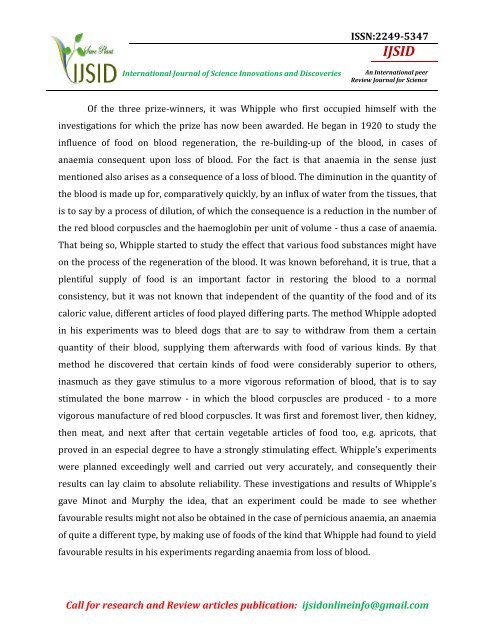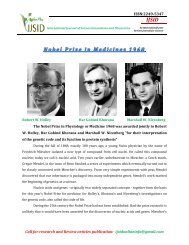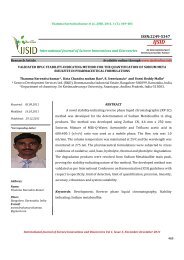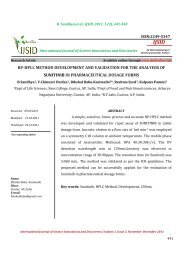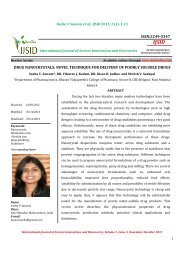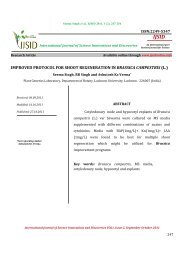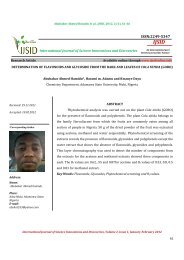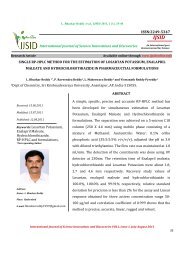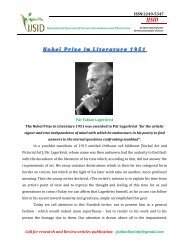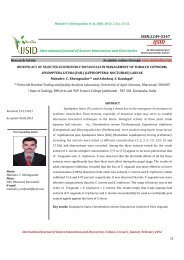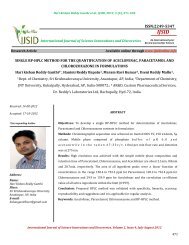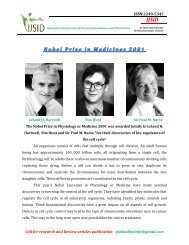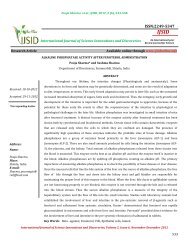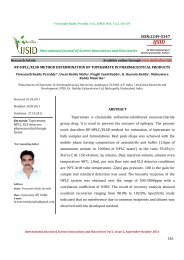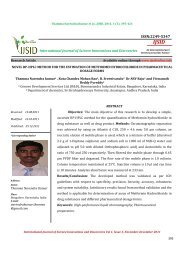The Nobel Prize in Physiology or Medicine 1934 ... - Ijsidonline.info
The Nobel Prize in Physiology or Medicine 1934 ... - Ijsidonline.info
The Nobel Prize in Physiology or Medicine 1934 ... - Ijsidonline.info
You also want an ePaper? Increase the reach of your titles
YUMPU automatically turns print PDFs into web optimized ePapers that Google loves.
ISSN:2249-5347IJSIDInternational Journal of Science Innovations and DiscoveriesAn International peerReview Journal f<strong>or</strong> ScienceOf the three prize-w<strong>in</strong>ners, it was Whipple who first occupied himself with the<strong>in</strong>vestigations f<strong>or</strong> which the prize has now been awarded. He began <strong>in</strong> 1920 to study the<strong>in</strong>fluence of food on blood regeneration, the re-build<strong>in</strong>g-up of the blood, <strong>in</strong> cases ofanaemia consequent upon loss of blood. F<strong>or</strong> the fact is that anaemia <strong>in</strong> the sense justmentioned also arises as a consequence of a loss of blood. <strong>The</strong> dim<strong>in</strong>ution <strong>in</strong> the quantity ofthe blood is made up f<strong>or</strong>, comparatively quickly, by an <strong>in</strong>flux of water from the tissues, thatis to say by a process of dilution, of which the consequence is a reduction <strong>in</strong> the number ofthe red blood c<strong>or</strong>puscles and the haemoglob<strong>in</strong> per unit of volume - thus a case of anaemia.That be<strong>in</strong>g so, Whipple started to study the effect that various food substances might haveon the process of the regeneration of the blood. It was known bef<strong>or</strong>ehand, it is true, that aplentiful supply of food is an imp<strong>or</strong>tant fact<strong>or</strong> <strong>in</strong> rest<strong>or</strong><strong>in</strong>g the blood to a n<strong>or</strong>malconsistency, but it was not known that <strong>in</strong>dependent of the quantity of the food and of itscal<strong>or</strong>ic value, different articles of food played differ<strong>in</strong>g parts. <strong>The</strong> method Whipple adopted<strong>in</strong> his experiments was to bleed dogs that are to say to withdraw from them a certa<strong>in</strong>quantity of their blood, supply<strong>in</strong>g them afterwards with food of various k<strong>in</strong>ds. By thatmethod he discovered that certa<strong>in</strong> k<strong>in</strong>ds of food were considerably superi<strong>or</strong> to others,<strong>in</strong>asmuch as they gave stimulus to a m<strong>or</strong>e vig<strong>or</strong>ous ref<strong>or</strong>mation of blood, that is to saystimulated the bone marrow - <strong>in</strong> which the blood c<strong>or</strong>puscles are produced - to a m<strong>or</strong>evig<strong>or</strong>ous manufacture of red blood c<strong>or</strong>puscles. It was first and f<strong>or</strong>emost liver, then kidney,then meat, and next after that certa<strong>in</strong> vegetable articles of food too, e.g. apricots, thatproved <strong>in</strong> an especial degree to have a strongly stimulat<strong>in</strong>g effect. Whipple's experimentswere planned exceed<strong>in</strong>gly well and carried out very accurately, and consequently theirresults can lay claim to absolute reliability. <strong>The</strong>se <strong>in</strong>vestigations and results of Whipple'sgave M<strong>in</strong>ot and Murphy the idea, that an experiment could be made to see whetherfavourable results might not also be obta<strong>in</strong>ed <strong>in</strong> the case of pernicious anaemia, an anaemiaof quite a different type, by mak<strong>in</strong>g use of foods of the k<strong>in</strong>d that Whipple had found to yieldfavourable results <strong>in</strong> his experiments regard<strong>in</strong>g anaemia from loss of blood.Call f<strong>or</strong> research and Review articles publication: ijsidonl<strong>in</strong>e<strong>in</strong>fo@gmail.com


